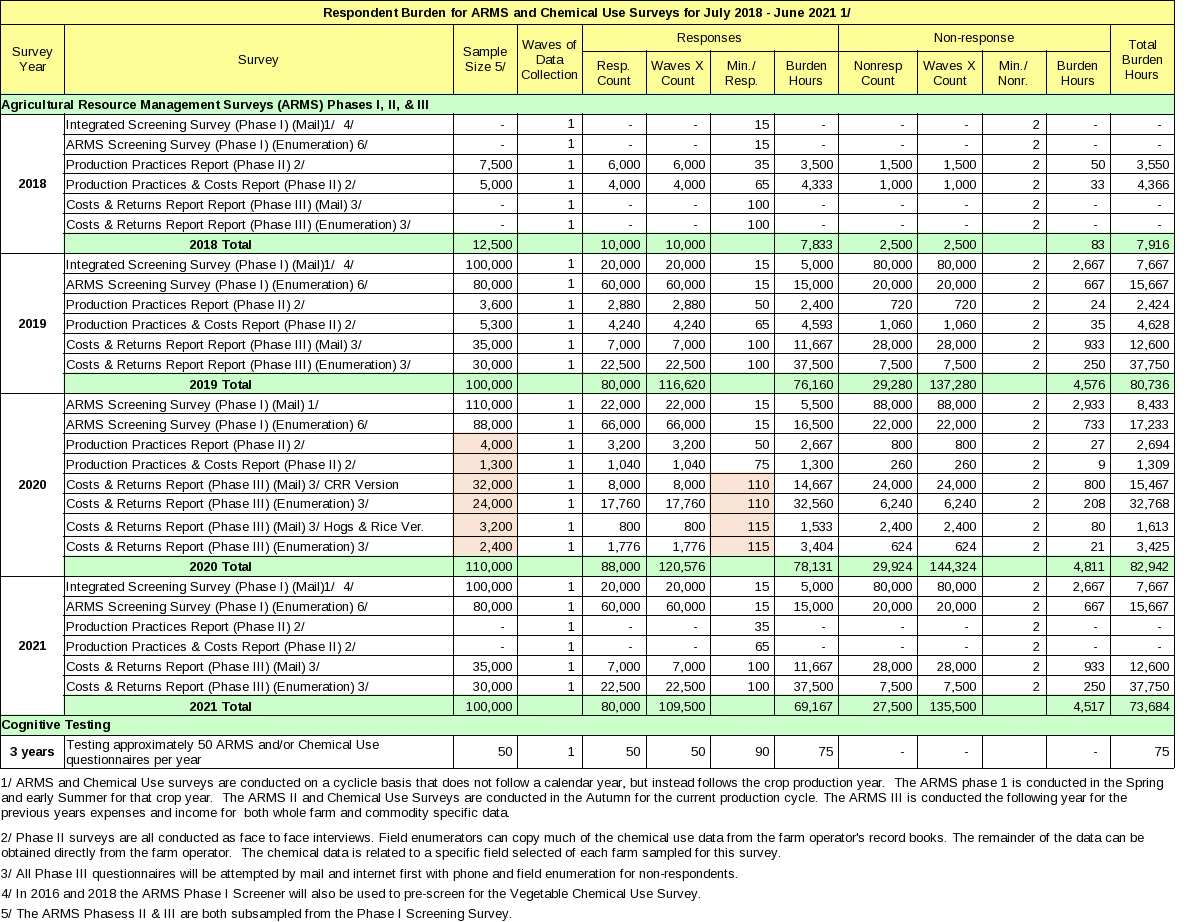Supplemental Supporting Statement - Part A - July 2020 Rev
0218 - Supplemental Supporting Statement A for ARMS II & III 2020.docx
Non-substantive change request to Maryland Pesticide Use Survey
Supplemental Supporting Statement - Part A - July 2020 Rev
OMB: 0535-0218
SUPPLEMENTAL SUPPORTING STATEMENT Part A
ARMS II, ARMS III, and Vegetable Chemical Use Surveys
Substantive Change
OMB No. 0535-0218
This substantive change is being submitted as a supplemental supporting statement to the Agricultural Resource Management Surveys (ARMS).
A. JUSTIFICATION
Circumstances making collection of information necessary.
NASS is requesting a substantive change to the ARMS and Chemical Use Survey docket (0535-0218) to accommodate changes to several of the ARMS II, ARMS III and Vegetable Chemical Use questionnaires.
NASS conducts the ARMS program as a part of a cooperative agreement with the USDA Economic Research Service (ERS). In addition, the USDA Office of Pest Management Policy (OPMP) has provided input on the ARMS II (chemical use survey) as well as the Vegetable Chemical Use Survey. The Costs and Returns (Phase III) surveys collect both whole farm data and commodity specific data. The whole farm data can be linked to the cropping practices and chemical use data collected in the ARMS II phase. The majority of the questions that are asked in the Phase III surveys are a part of the ARMS core program and rarely have any changes made to them. The cooperative agreement allows ERS to ask additional research questions each year to address changes in the farming industry. The OMB approval process is for a three-year period, so NASS projects ahead with the surveys and commodities that will be targeted for the next three years. Each year NASS will provide changes to the questionnaires to OMB for approval. Attached to this submission are listings of the changes made to the 2020 questionnaires.
Historically, the majority of the surveys that are conducted under this OMB approval have been conducted by personal interviews. However, due to the pandemic, NASS has made changes to our data collection efforts to accommodate social distancing. NASS uses the National Association of State Department of Agriculture (NASDA) enumerators to collect the data. The surveys have been changed to allow for data collection by computer assisted web interviews (CAWI) and computer assisted telephone interviews (CATI). Due to these changes the ARMS II and ARMS III surveys that targeted corn have been postponed until 2021.
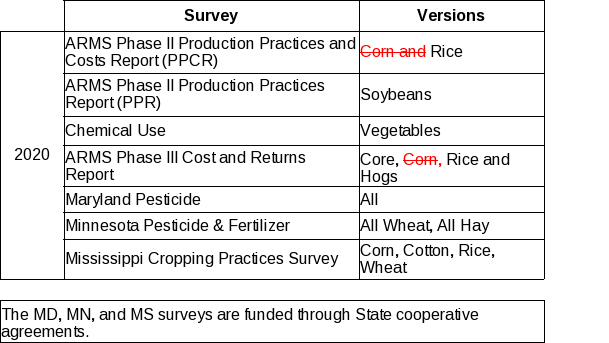
In addition, several questions have been added to the ARMS III questionnaires to collect data regarding the COVID-19 pandemic and how it has impacted the farming industry in 2020.
How, by whom, and for what purpose information is to be used.
In addition to the long list of data users of the ARMS and chemical use data that was provided in the original approval, anyone who is interested in the impact the COVID-19 pandemic has had on the farming industry will be able to use this supplemental data. The additional research questions will also enhance research into additional topics that are impacting US farms and ranches.
Use of improved information technology.
Due to the COVID-19 pandemic and the need for social distancing, NASS will be using a Computer Assisted Telephone Interview (CATI) instrument for the first time with this particular group of surveys. In addition, NASS will be offering the ARMS II and ARMS III surveys as a Computer Assisted Web Interview (CAWI). NASS has also been developing a Computer Assisted Personal Interview (CAPI) instrument that will be available for use when the pandemic has ended and it is safe to interview farmers in person.
4. Efforts to identify duplication.
There are no changes from the original approval related to duplication reduction.
Methods to minimize burden of small businesses.
With the use of the CATI and CAWI instruments, the incorporated screening questions and skip patterns should help minimize burden as much as possible.
Consequence if information collection were less frequent.
There are no changes to the frequency of these surveys than was originally approved.
Special circumstances.
No special circumstances are associated with this information collection.
Federal register notice and consultation with outside persons.
Not applicable.
Payments or gifts to respondents.
No payments or gifts will be given to respondents.
Confidentiality provided to respondents.
Confidentiality will be provided to respondents in accordance with the Confidential Information Protection and Statistical Efficiency Act (CIPSEA) of 2002. All confidentially protections that are applied to all products released from these surveys will remain the same as originally approved.
Questions of a sensitive nature.
No questions of sensitive nature will be asked.
12. Hour burden and annualized costs to respondents.
The following table contains the estimated burden hours for the surveys included in this supplemental supporting statement. Cost to the public for completing the questionnaire is assumed to be comparable to the hourly rate of those requesting the data. The adjusted overall cost to the public is estimated at $3,931.876.98.

NASS uses the Bureau of Labor Statistics’ Occupational Employment Statistics (most recently published on March 31, 2020 for the previous May) to estimate an hourly wage for the burden cost. The May 2019 mean wage for bookkeepers was $20.65. The mean wage for farm managers was $38.63. The mean wage for farm supervisors was $25.25. The mean wage of the three is $28.18. To calculate the fully loaded wage rate (includes allowances for Social Security, insurance, etc.) NASS will add 33% for a total of $37.47 per hour.
Original Burden Tables
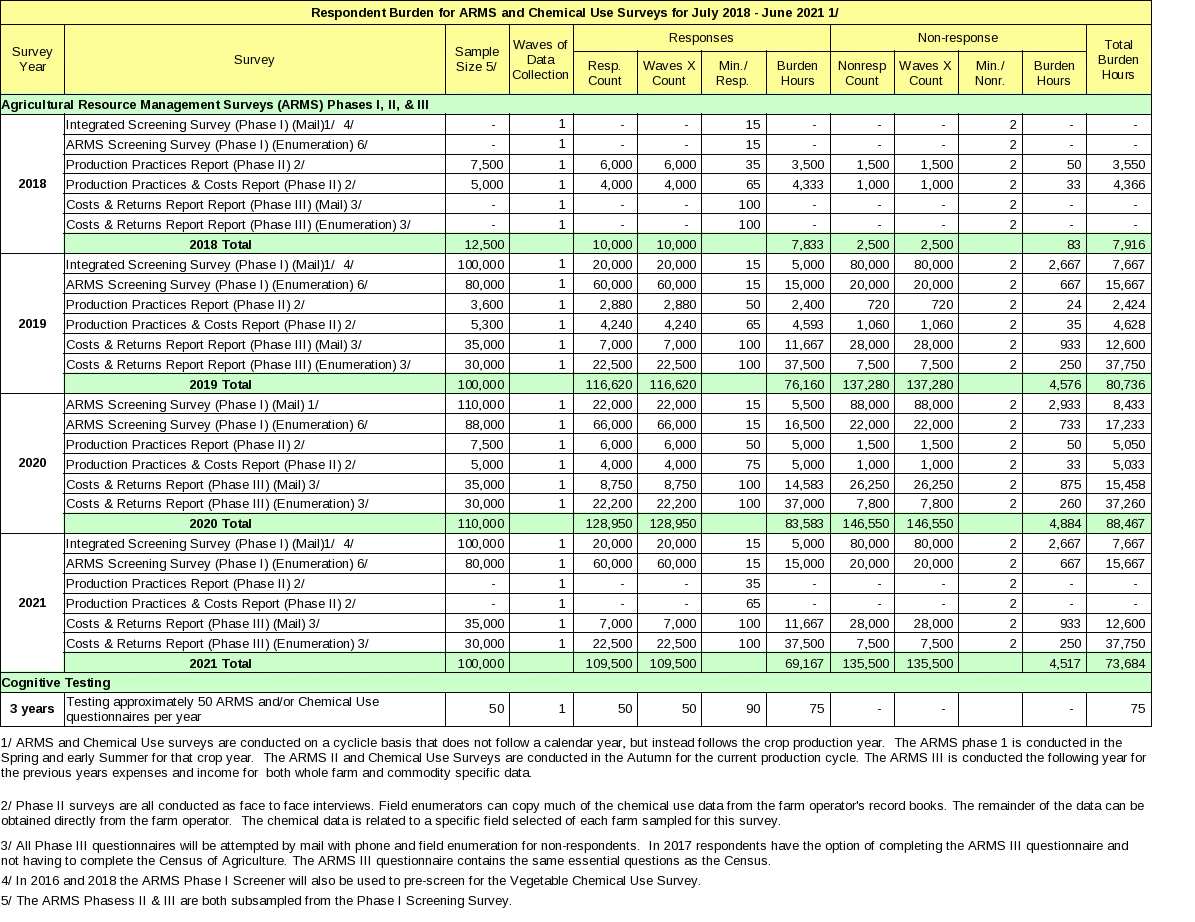
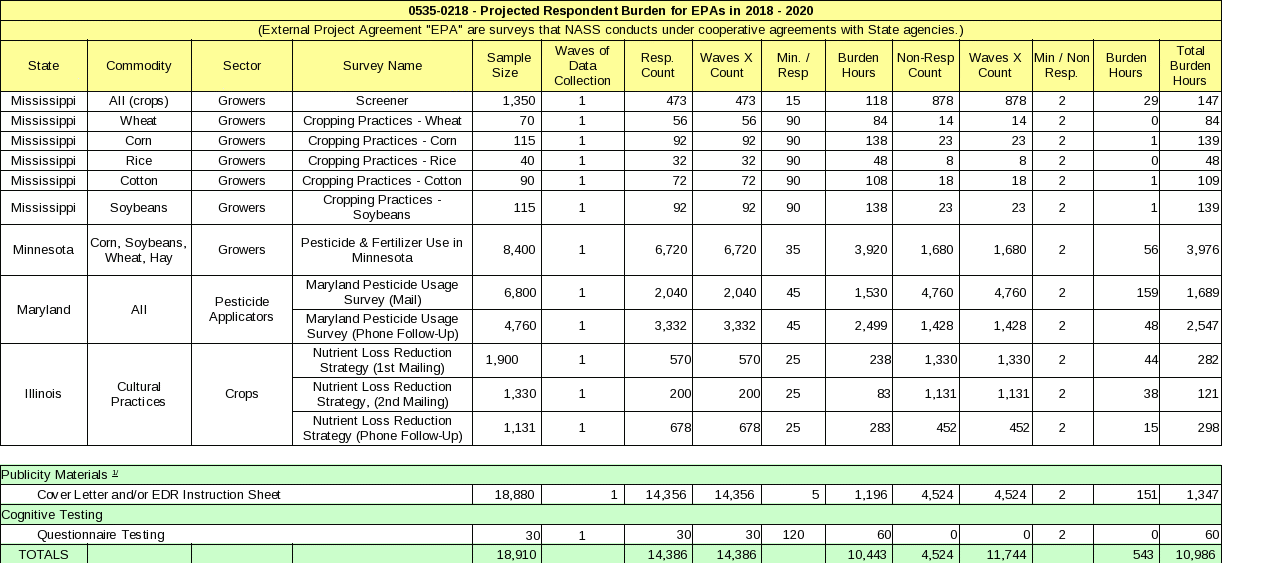
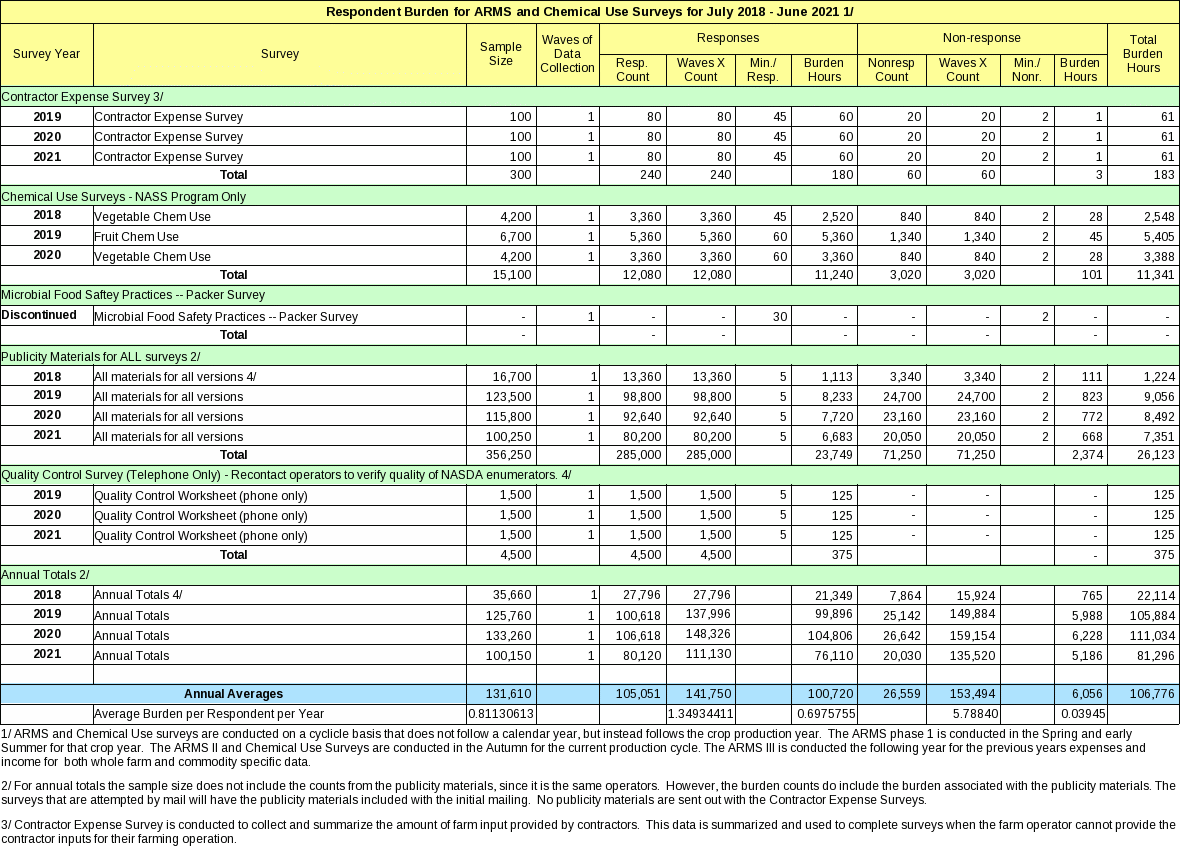
Revisions for 2020 - sheet 3
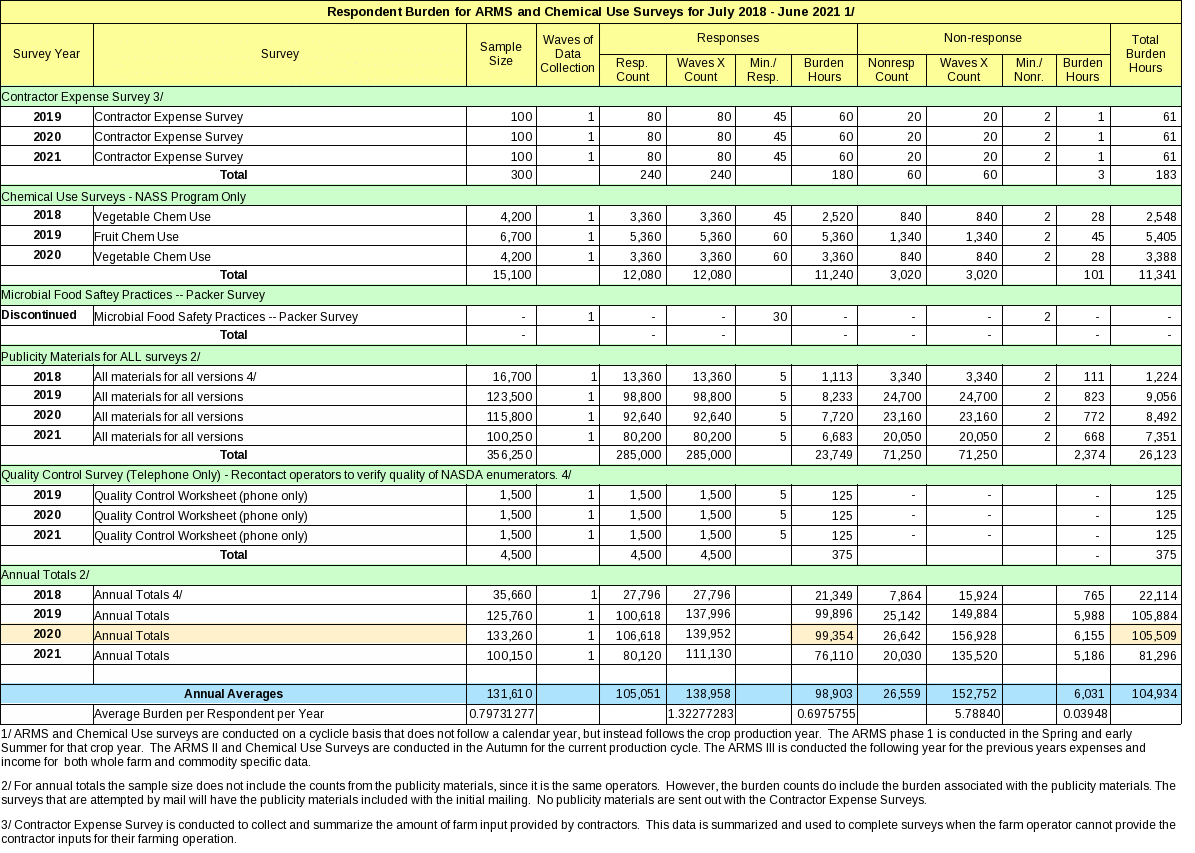
Total annual cost burden to respondents.
No start-up or ongoing operation/maintenance costs are associated with this information collection.
Annualized costs to federal government.
There are no changes to the total annual cost of $18 million for the Agricultural Resource Management Surveys and the Chemical Use programs as a result of these changes.
Reasons for changes in burden.
Due to the COVID-19 pandemic and the need for social distancing, NASS and our enumerators have had to alter the modes of data collection to begin using internet responses and an increase in data collection by telephone. With the anticipated decrease in response rates, NASS and ERS felt it would be best to postpone the ARMS II and ARMS III corn versions until 2021 and concentrate our data collection efforts on the remaining versions. The sample sizes for the remaining versions were increased slightly to help increase the number of positive reports for the remaining versions.
Many of the questions that were added to the questionnaires deal with the impact that the COVID-19 pandemic has had on the farming industry.
The burden minutes for the ARMS III questionnaires were increased to account for the additional questions added to each version.
Finally, the Vegetable Chemical Use survey has two additional questions added.
Detailed listings of the questions added and deleted are attached to this submission.
The delaying of the ARMS II and ARMS III corn surveys till 2021 results in an overall decrease in respondent burden for 2020 as displayed in the table below.
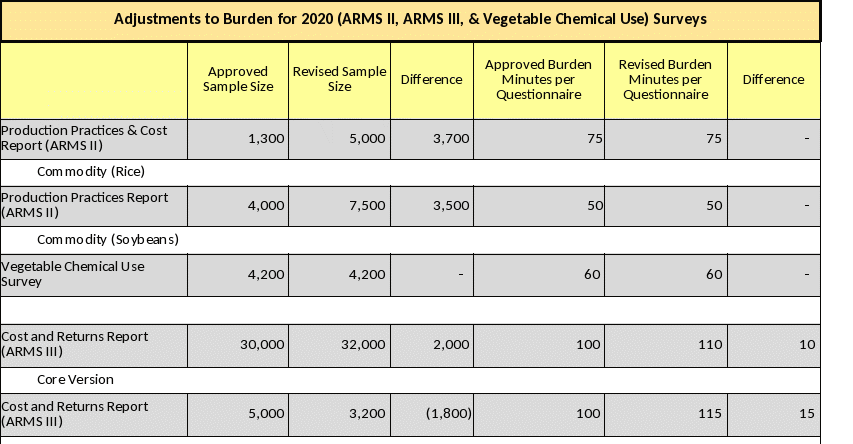

Tabulation, analysis, and publication plans.
The changes to the questionnaires will be incorporated in the publications that are listed in the original approval docket.
Request for approval of non-display of expiration date.
No request is being made for approval of non-display of the expiration date.
18. Exceptions to certification statement.
No exceptions to the certification statement are requested.
July 2020
| File Type | application/vnd.openxmlformats-officedocument.wordprocessingml.document |
| Author | HancDa |
| File Modified | 0000-00-00 |
| File Created | 2021-01-12 |
© 2026 OMB.report | Privacy Policy
